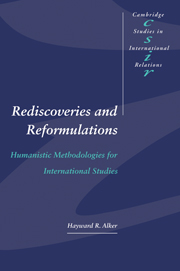Book contents
- Frontmatter
- Contents
- List of figures
- List of tables
- Acknowledgments
- Introduction: Voyages of rediscovery
- Part I Recovering Western antiquity
- 1 The dialectical logic of Thucydides' Melian Dialogue
- 2 Aristotelian political methodologies
- 3 Toynbee's Jesus: Computational hermeneutics and the continuing presence of classical Mediterranean civilization
- Part II The humanistic science of the modern classics
- Part III Contemporary humanistic reformulations
- References
- Index
- CAMBRIDGE STUDIES IN INTERNATIONAL RELATIONS
2 - Aristotelian political methodologies
Published online by Cambridge University Press: 13 January 2010
- Frontmatter
- Contents
- List of figures
- List of tables
- Acknowledgments
- Introduction: Voyages of rediscovery
- Part I Recovering Western antiquity
- 1 The dialectical logic of Thucydides' Melian Dialogue
- 2 Aristotelian political methodologies
- 3 Toynbee's Jesus: Computational hermeneutics and the continuing presence of classical Mediterranean civilization
- Part II The humanistic science of the modern classics
- Part III Contemporary humanistic reformulations
- References
- Index
- CAMBRIDGE STUDIES IN INTERNATIONAL RELATIONS
Summary
We've lost the idea that politics are part of the humanities.
Martha Nussbaum (1989: 459)Politics was always, to the Greeks, an “art” as well as a “science.”
Ernest Barker (1958: xiii)Nature always strives after “the better.”
Aristotle, On Generation and Corruption (336b28)Inspired by Thucydides' great study of the Peloponnesian war, in chapter 1 I suggested the possibility of a neoclassical Polimetrics, dialectically grounded in human experience, focused on contextually appropriate practical-normative standards of just conduct and institutional worth; its preferred dialectical “logic” would be modern argumentation theory. In the present chapter, I shall report on further explorations of the Western classical tradition for its insights into the appropriate tasks of political inquiry. I want to suggest how a methodological rereading of Aristotle can help us revise, enlarge and carry forward the neoclassical conception of politics and political methodology presented above. This rereading will find a multidisciplinary Aristotle employing and suggesting a variety of methodologies for sociopolitical inquiry. His approaches to Political Science will be found to be grounded in three characteristically different ideal types: an Ethical Aristotle, a Synthetic Aristotle, and an Aristotle for the ages – a Cosmological Aristotle.
Why pay special attention to Aristotle in a book on international studies? What purposes have I had in recovering contemporarily oriented, methodologically relevant Aristotles? Aristotle has been arguably the most influential philosopher/practitioner of scientific and humanistic studies in the history of Western civilization.
- Type
- Chapter
- Information
- Rediscoveries and ReformulationsHumanistic Methodologies for International Studies, pp. 64 - 103Publisher: Cambridge University PressPrint publication year: 1996



